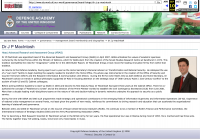Jamie Macintosh
Dr. J.P. MacIntosh was the Head of the Advanced Research and Assessment Group (ARAG) from April 2007 until it was merged into the Research and Assessments Branch of the Defence Academy on 1 April 2009, wherupon he be came the 'Chief' of the new body.[1][2]
Background
Prior to becoming an MoD Research Scientist MacIntosh 'served in the British Army for ten years. His final operational tour was in Bosnia during most of 1993.'[2]
Macintosh joined DERA in 1993, moving on to DSTL on its creation in 2001. During his time there he was involved in ‘leading multi-disciplinary teams on the nature of risk and decision-taking in dynamic networks’. Such programmes made, according to the Defence Academy ‘strategic and operational contributions in the emerging fields of Information Superiority and Information Operations (IS-IO).’ According to an Mod biographical note:'Experience of national crisis management on several fronts, not least given the growth of new media, reinforces his commitment to driving research and education that can accelerate the organisational learning of statecraft and governance.[2]

From 2001 Macintosh and his colleague, the anthropologist Mils Hills worked on the creation of Civil Contingencies Secretariat, the main body responsible for co-ordinating counter-‘terrorism’ preparations in the UK. Macintosh collaborated with the head of the Government Information and Communication Service, Mike Granatt, in co-authoring the White Paper 'and conceptual research design' 'at the direction of the Prime Minister'[3] that led to the creation of the Cabinet Office's Civil Contingencies Secretariat in 2001. The Civil Contingencies Secretariat was the body involved in issuing information about the alleged threat to Heathrow Airport and on the ‘Ricin plot’, which turned out not to involve any Ricin.[4]
Before being appointed the Head of the ARAG, MacIntosh spent over a year as the Home personal advisor to Home Secretary John Reid on Transformation and National Security. The MoD biographical note on him claims that 'He catalysed the use of a "war room" facility to begin building the capacity needed to transform the Home Office'[5] It also claims that his advice on 'trends in political philosophy' supported Dr Reid in 'focusing attention on the strategic issue of "20th Century Rules / 21st Century Conflict" to the acclaim of both US and EU Cabinet colleagues.'[2]
His advice, the MoD claims, 'was instrumental' in the creation the Research, Information and Communications Unit (RICU), and the Office of Security and Counter Terrorism (OSCT).[2]
Activities
Macintosh was a guest speaker at the High Reliability Organizations 2007 International Conference, Deauville in France.[6]
- Oxford University Strategic Studies Group Dr Jamie MacIntosh (incoming) Head of the Defence Academy’s Advanced Research and Assessment Group Tuesday, 5 June 2007, 8:30 pm in the Old Library, All Souls College, Oxford.
Affiliations
- 2001-2006 served on the Council of Royal United Services Institute(RUSI). He continues to be a member of RUSI's Finance and Performance Committee | member of the International Institute of Strategic Studies (IISS) | member of the Army Mountaineering Association (AMA).
Publications, Talks
- Jamie MacIntosh Defence Evaluation and Research Agency 'INFORMATION OPERATIONS / INFORMATION ASSURANCE' CSRC/LSE Public Security Colloquia Series, Thursday March 12 1998
- The world's major Ministries of Defence are increasingly pre-occupied with the notion of Information Warfare. Two particular concerns are pre-eminent: the possibility of attacks on a country's critical infra-structures and how the security services can respond; the use of sophisticated IT systems to support and enhance the armed services. In the UK much of the research work is carried out by DERA and the speaker will report on recent activity.[7]
- J. P. MacIntosh (1998) 'Connectivity: The Space, Tempo, and Exploitation of Risk in the Information Age.' in Cyberwar 2.0: Myths, Mysteries and Reality edited by Alan D. Campen and Douglas H. Dearth. AFCEA International Press, 4400 Fair Lakes Court, Fairfax, Virginia 22033-3899, 1998, 398 pages.
- Corcoran, Michael J. and J. P. MacIntosh. “Military Operations and Their Reliance on the National Information Infrastructure (NII) and Minimum Essential Defense Information Infrastructure (MEDII) in an Information Warfare Scenario.” p. 922-925, IN: Proceedings of the 1998 Command and Control Research and Technology Symposium. Naval Postgraduate School, Monterey, CA, 29 June - 1 July 1998. Washington, DC: National Defense University, 1998. 943p.
- J. P. MacIntosh, “Who Can Afford Passion? Emergent Conflict and the Challenge of Complexity: Leading Beyond Pragmatics,” Analytic Approaches to the Study of Future Conflict, (Toronto: Canadian Institute for Strategic Studies, 1999).
- The Psychology of Future Warfare: Asymmetric Risk and Decision-taking (with JP MacIntosh) in Campen, Alan D.; Dearth, Douglas H. (Eds), Cyberwar 3.0, AFCEA International Press, January 2001[8]
- M. S. D. Granatt, Head of GICS, Cabinet Office and J. P. Macintosh DSTL, Ministry of Defence, Building Resilience: a new approach to crisis, Civil Contingencies Secretariat, July 2001 and revised in February 2002. Classified document.[9]
External resources
- Ben Quinn, UCL thinktank backed by arms firm raises concern, The Guardian, 26 December 2012
Notes
- ↑ Research & Assessment Branch (R&AB), Defence Academy of the United Kingdom website, accessed 4 Feb 2010.
- ↑ Jump up to: 2.0 2.1 2.2 2.3 2.4 Defence Academy Dr. J. P Macintosh, Retrieved from the Internet Archive of 15 April 2008,accessed 12 August 2011
- ↑ HRO 2007 Speakers, accessed 6 May 2009
- ↑ Miller, David (2004) ‘The Propaganda machine’ in David Miller (ed.) Tell Me Lies (London, UK: Pluto)
- ↑ Defence Academy Dr. J. P Macintosh, accessed 6 May 2009
- ↑ HRO 2007 Speakers, accessed 6 May 2009
- ↑ LSE CSRC Security Colloquium Advance Notice of Meetings in Spring 1998 CSRC/LSE Public Security Colloquia Series The Computer Security Research Centre at the London School of Economics runs a series of public colloquia on selected Thursday evenings in Central London. LSE Vera Anstey Room 18:00-19:45
- ↑ Applications of Anthropology: An Exotic Input to the Defence and Security Community Dr Mils Hills, The Cabinet Office, Ministry of Defence, University of Loughborough, Abstracts, accessed 28 May 2009
- ↑ Patrick Jenkin to the Prime Minister PRIME MINISTER Community Relations Written Answers, 22 Mar 2010 : Column 2W
